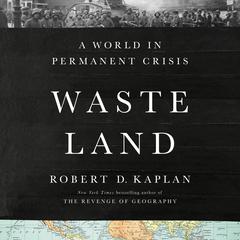 Play Audiobook Sample
Play Audiobook Sample
Monsoon: The Indian Ocean and the Future of American Power Audiobook
 Play Audiobook Sample
Play Audiobook Sample
Quick Stats About this Audiobook
Total Audiobook Chapters:
Longest Chapter Length:
Shortest Chapter Length:
Average Chapter Length:
Audiobooks by this Author:
Publisher Description
On the world maps common in America, the Western Hemisphere lies front
and center, while the Indian Ocean region all but disappears. This
convention reveals the geopolitical focus of the now-departed twentieth
century, but in the twenty-first century that focus will fundamentally
change.
In this pivotal examination of the countries known as "Monsoon
Asia"—which include India, Pakistan, China, Indonesia, Burma, Oman, Sri
Lanka, Bangladesh, and Tanzania—bestselling author Robert D. Kaplan
shows how crucial this dynamic area has become to American power. It is
here that the fight for democracy, energy independence, and religious
freedom will be lost or won, and it is here that American foreign policy
must concentrate if the United States is to remain relevant in an
ever-changing world. From the Horn of Africa to the Indonesian
archipelago and beyond, Kaplan exposes the effects of population growth,
climate change, and extremist politics on this unstable region,
demonstrating why Americans can no longer afford to ignore this
important area of the world.
Download and start listening now!
"An excellent book about the geopolitics and history of the Indian Ocean region and its implications for America. His thesis is that the Indian Ocean region, even more so than the Western Pacific, will be the location for most of the conflicts in the coming decades."
— David (4 out of 5 stars)
Quotes
-
The book's political and economic focus and forecasts are smart and brim with aperçus on the intersection of power, politics, and resource consumption (especially water), and give full weight to the impact of colonialism.
— Publishers Weekly Starred Review
Monsoon Listener Reviews
-
" Book describes the significant current and related historical geographics and political conditions of countries bordering the Indian Ocean from Zanzibar in Africa through Oman, the Indian Subconinent and to eastern oceanic island nations including Indonesia. "
— Dan, 2/15/2014 -
" One third travelogue, one third history, and one third loosey-goosey second-hand strategic analysis. It is an interesting primer to the region if you can handle the human-interest travelogue bits. It also contains a passable analysis of China's likely naval interests in the region. "
— Matthew, 1/30/2014 -
" This was a good read, taking in all the countries that have shores on the Indian Ocean, and with a proper amount of author's attitude. Not light reading, but not too tough either. I learned a lot, particularly about China and many small countries. "
— Glen, 1/30/2014 -
" Should have been a romance novelist (e.g. description of Muscat). Couldn't make it past the first 50 pages. "
— Peter, 1/27/2014 -
" I had never thought of the Indian Ocean as a unifying geographic location, but this book makes a good case for it historically and in the future. Very interesting. "
— Michael, 1/16/2014 -
" This book gave me an education on the importance of the Indian Ocean. I am so glad I read it. "
— Margaret, 1/15/2014 -
" WARNING: Heavy lifting ahead. I wouldn't recommend this to anyone but geopolitical geeks. Really fantastic in depth analysis. Worth it if u are highly motivated. "
— Jimileek, 12/19/2013 -
" I've never learned so much about the Indian Ocean region, and now appreciate what it means for the future. "
— Dane, 11/2/2013 -
" "Perceptive combination of history and current affairs, with policy implications and recommendations for the United States," "
— Steve, 8/26/2013 -
" A thorough analysis of the cultural histories of the regions from Oman to Burma; the battles in the region, the economic competition and how it applies to the US and other modern powers. "
— Jennifer, 5/14/2013 -
" An overview of U.S. policy interests in the Indian Ocean, from Tanzania to Indonesia. At its best, Monsoon reorients the map and allows us to think about global challenges in a new, useful way. "
— John, 3/21/2013
About Robert D. Kaplan
Robert David Kaplan is an American journalist, currently a National Correspondent for the Atlantic Monthly. His writings have also been featured in numerous other newspapers and publications, and his more controversial essays about the nature of US power have spurred debate in academia, the media, and the highest levels of government. A frequent theme in his work is the reemergence of cultural and historical tensions temporarily suspended during the Cold War.
About John Pruden
John Pruden is an Earphones Award–winning audiobook narrator. His exposure to many people, places, and experiences throughout his life provides a deep creative well from which he draws his narrative and vocal characterizations. His narration of The Killing of Crazy Horse by Thomas Powers was chosen by the Washington Post as a Best Audiobook of 2010.


































